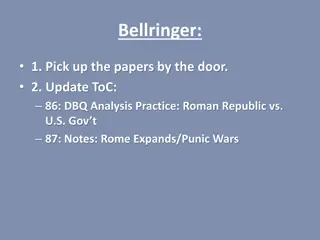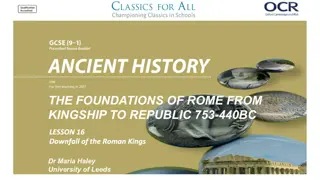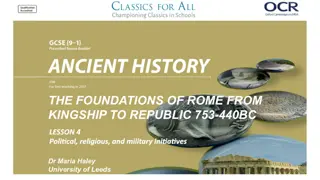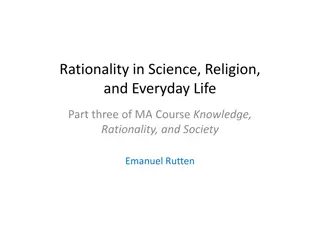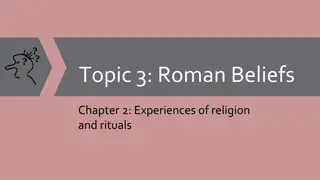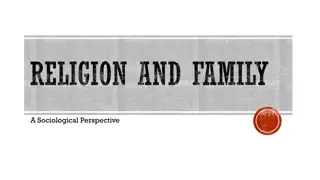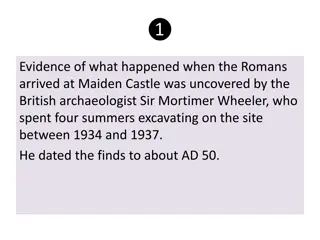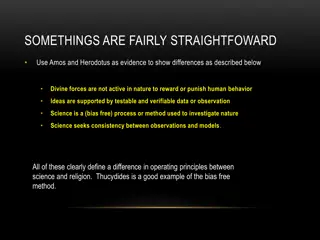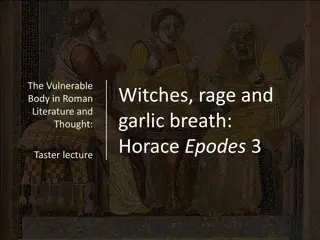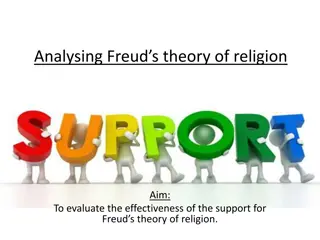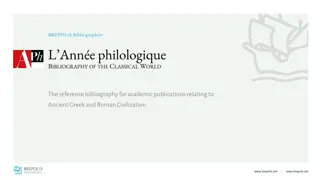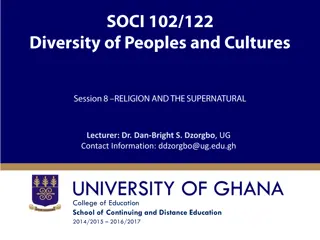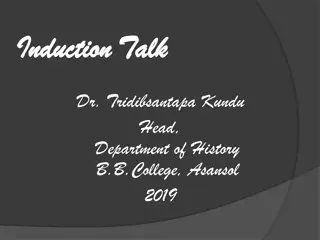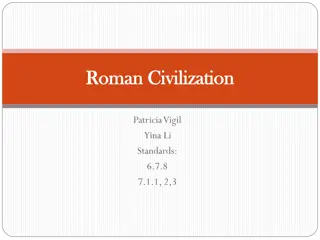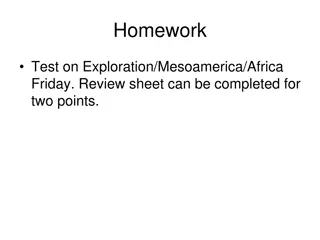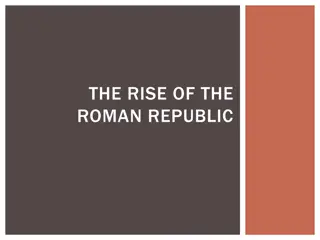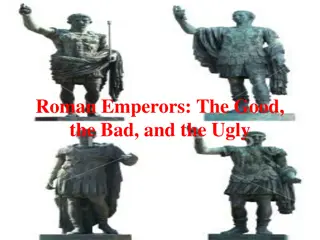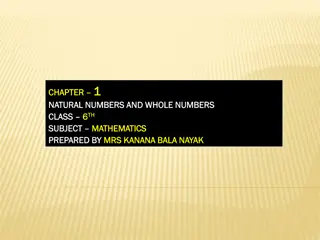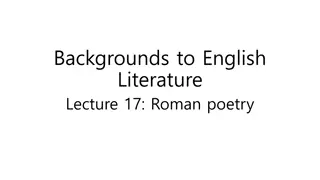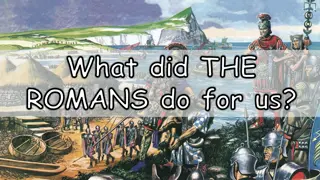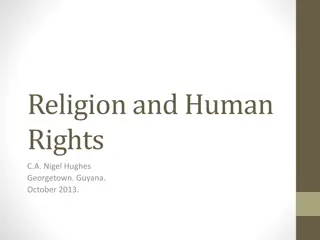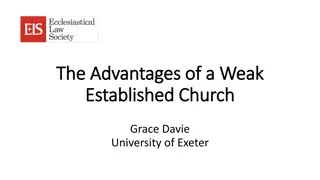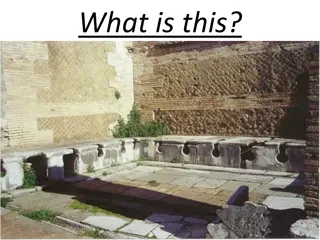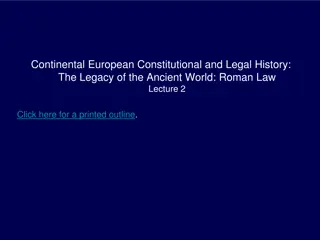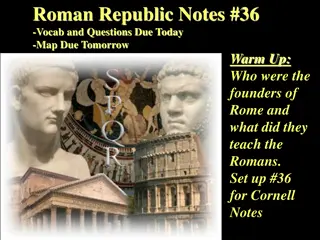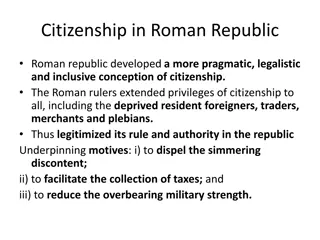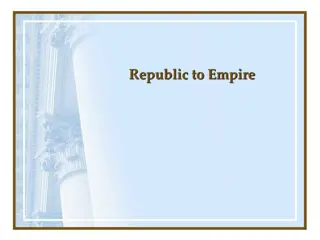Census 2021: Religion and non-religion in England and Wales
Explore ideas for analyzing the religion and non-religion data from the 2021 Census in England and Wales, aimed at KS2 and KS3 levels. Discover trends in percentages, compare global religious beliefs, investigate the distribution of different religions in various regions, and delve into the practice
0 views • 11 slides
Read⚡ebook✔[PDF] Blood of the Provinces: The Roman Auxila and the Making of Pro
\"COPY LINK HERE ; https:\/\/getpdf.readbooks.link\/0198795440\n\n[PDF READ ONLINE] Blood of the Provinces: The Roman Auxila and the Making of Provincial Society from Augustus to the Severans | Blood of the Provinces: The Roman Auxila and the Making of Provincial Society from Augustus to the Severan
2 views • 6 slides
READ⚡[PDF]✔ European Mail Armour: Ringed Battle Shirts from the Iron Age, Roman
\"COPY LINK HERE ; https:\/\/getpdf.readbooks.link\/9463721266\n\nDOWNLOAD\/PDF European Mail Armour: Ringed Battle Shirts from the Iron Age, Roman Period and Early Middle Ages (Amsterdam Archaeological Studies) | European Mail Armour: Ringed Battle Shirts from the Iron Age, Roman Period and Early
12 views • 6 slides
Evolution of Property Transfer in Roman Law
Comparative Property Law explores the evolution of property transfer in Roman law. In classical Roman law, property transfer required an external act of delivery. Over time, formal acts like mancipatio and traditio became common for property transfer. During the Justinian period, traditio became the
4 views • 24 slides
Roman Republic Expansion and Punic Wars Overview
Learn about the Roman Republic's expansion from 350 B.C.E. to 150 B.C.E., including their policies towards conquered territories, trade networks, and conflicts with Carthage in the Punic Wars. Explore key aspects of Roman society, politics, economics, and culture during this period through bellringe
1 views • 32 slides
Insights into Roman Medicine and Writers of Antiquity
Explore the rich history of Roman medicine and literature through the writings of influential figures like Pliny the Elder. Discover how Roman cures for ailments were associated with treatments such as baths and exercises. Uncover fascinating details about medical practices, including the first phys
0 views • 15 slides
The Downfall of the Roman Kings: Lucretia's Role in Establishing the Republic
The Rape of Lucretia by Sextus Tarquinius was a key event leading to the downfall of the Roman kings and the establishment of the Republic. Lucretia's character, representing chastity and virtue, inspired Brutus to take a stand against the tyrannical rulers. Brutus's impassioned speech and vow marke
3 views • 6 slides
Comparative Analysis of Roman Foundational Myths
The task involves analyzing the foundation myths of Rome, focusing on the development, religious, and military initiatives. By comparing Livy and Dionysius' interpretations of Romulus's contributions, considering issues of trustworthiness, and creating infographics on Roman hierarchy and omens, stud
0 views • 6 slides
Historical Origins and Formation of German Law: Influence of Roman Law
The historical origins and formation of German law were shaped significantly by the late contact with Roman law during the Medieval and Renaissance period. The weak central imperial power, rising influence of territorial rulers, and the lack of a common legal system in Germany prompted the appeal fo
0 views • 23 slides
Rationality in Science, Religion, and Everyday Life: Exploring Belief Formation and Rational Decision-Making
Explore the essence of rational belief formation across science, religion, and daily life through the lens of cognitive processes, decision-making, and value systems. Delve into the conditions for rational belief, practical decision-making, and axiological rationality to understand human cognition a
1 views • 142 slides
Unveiling Roman Britain: Lessons on Inscriptions and Everyday Life
Delve into the world of Roman Britain through inscriptions, exploring the lives of its inhabitants. Lesson 2 focuses on deciphering inscriptions to unveil historical insights. Learn to craft historically-valid questions using key words and understand how these artifacts reveal details about everyday
0 views • 13 slides
Roman Beliefs and Religious Practices in Pompeii
Explore the diverse experiences of Roman religion in Pompeii, where worship of multiple gods was common and individuals had the flexibility to honor both official and personal deities. Learn about the tolerant attitude towards religious differences in the Roman Empire and how beliefs evolved over ti
1 views • 6 slides
Overview of Early Christian Martyrs in the Roman Empire
Explore the historical context of early Christian martyrs in the Roman Empire, starting from the first century with the reign of Augustus to the turmoil and persecutions in the third century under emperors like Diocletian. Learn about the Roman religion, the Five Good Emperors, and the social dynami
0 views • 24 slides
Roman Civilization: Contributions and Daily Life
Delve into the intriguing world of ancient Rome through a visual journey showcasing the impact of Roman civilization. Discover the architecture, art, infrastructure like roads and drains, calendar systems, coins, and the luxurious baths they enjoyed. Uncover the influence of the Roman Empire on vari
0 views • 20 slides
The Intersection of Religion, Family, and Society
Explore the sociological perspective on religion and family dynamics. Religion encompasses a set of beliefs and practices centered around sacred phenomena, shaping social norms and offering meaning. Religious affiliations, beliefs, and attendance reflect individual and collective values. Conservativ
0 views • 43 slides
Uncovering Evidence of Roman Arrival at Maiden Castle by Sir Mortimer Wheeler
British archaeologist Sir Mortimer Wheeler excavated Maiden Castle between 1934 and 1937, uncovering evidence of the Roman arrival around AD 50. The site revealed insights into the Roman invasion in AD 43, showcasing advanced Roman equipment like the ballista. The discovery included carefully buried
0 views • 6 slides
Contrasting Science and Religion Through Ancient Philosophers
The content explores the differences between science and religion using examples from ancient philosophers like Amos, Herodotus, and Epicurus. It highlights how science relies on testable data and unbiased processes, while religion involves divine forces and unverifiable beliefs. The text emphasizes
0 views • 5 slides
The Roman Missal - Celebrating the Eucharist
Explore the significance of the Roman Missal in understanding and navigating the celebration of the Eucharist within the Catholic Church. Delve into the theological premises, participation of the faithful, and Christ's transformative presence in the liturgy. Discover the core themes and roles outlin
0 views • 33 slides
Exploring Vulnerability and Power in Roman Literature: Horace's Epodes and More
Delve into the themes of vulnerability, power, and fragility in Roman literature through the works of Quintus Horatius Flaccus, known as Horace. Explore the use of witches, garlic breath, and rage in his Epodes, while also examining the broader concepts of aging, modern parallels, and societal chall
0 views • 9 slides
Roman Political History: From Rise of Pompey to Reign of Augustus
In the tumultuous period of Roman history from the rise of Pompey to the reign of Augustus, we witness pivotal events such as the Alliance of the First Triumvirate, the civil war between Pompey and Julius Caesar, Caesar's assassination, the rise of Octavian, and the establishment of the Second Trium
0 views • 20 slides
Critique of Freud's Theory of Religion: Examining Evidence and Key Criticisms
The analysis delves into Sigmund Freud's theory of religion, evaluating its support and challenges. The presentation highlights key criticisms regarding historical, anthropological, and psychological evidence, as well as Freud's conclusions on religion. Critiques focus on the lack of evidence for co
0 views • 19 slides
Comprehensive Bibliography on Ancient Greek and Roman Civilization
Explore L'Année Philologique, an international bibliography covering a wide range of subjects related to Ancient Greek and Roman civilizations. With over 900,000 bibliographic records and 575,000 book review references, it serves as a valuable resource for academic research. The database includes p
0 views • 8 slides
African Traditional Religion and its Beliefs: An Overview
Understanding African traditional religion involves exploring the concept of the Supreme God, ancestor worship, witchcraft, magic, sorcery, and divination. This session delves into the relationship between religion, social rituals, and festivals, illustrating how it contributes to social solidarity.
0 views • 12 slides
Greek and Roman Historians and Early Historic India
Delve into the world of Greek and Roman historians such as Herodotus, Thucydides, Livy, and Tacitus, analyzing their methods of historical inquiry and writing. Discover the vibrant past of early historic India up to the 6th century B.C., exploring diverse cultural traditions and archaeological sourc
0 views • 14 slides
Roman Civilization Overview
Roman civilization was influenced by Greek culture, as seen in their art, literature, and architecture. Roman artists and writers borrowed ideas from the Greeks but adapted them to suit their needs. They created realistic statues, innovative buildings with features like arches and domes, and iconic
0 views • 36 slides
Impact of Geography and Religion on African Society
African society was heavily influenced by geographic features such as diverse climates, terrains, and the Bantu migrations, which spread language, technology, and farming techniques. Additionally, religion, specifically animism, shaped beliefs and practices. The question posed at the end challenges
0 views • 8 slides
The Rise of the Roman Republic and Political Evolution in Ancient Rome
The Roman Republic emerged in 509 B.C.E. as a form of government with elected leaders, initially only accessible to Patricians. This led to a division between Patricians and Plebeians, the latter being the majority of the population. The Senate, Consuls, and Tribunes played key roles in shaping Roma
0 views • 17 slides
Roman Emperors Through History: The Good, the Bad, and the Ugly
Explore the fascinating history of Roman emperors, from the wise and just rulers like Augustus and Marcus Aurelius to the tyrannical and infamous ones such as Caligula and Nero. Learn about their achievements, controversies, and ultimate fates, shaping the course of the ancient Roman Empire.
0 views • 10 slides
Natural Numbers, Whole Numbers, and Roman Numerals
This chapter delves into the concepts of natural numbers, whole numbers, and Roman numerals. It covers the basics of numeral systems, properties of whole numbers, and rules for Roman numerals. Learn about counting numbers, place value, successors, predecessors, and more to build a strong mathematica
0 views • 11 slides
Overview of Roman Poetry and The Eclogues: A Study in Roman Literature
Roman poetry encompassed various genres such as epic, drama, lyric, satire, and pastoral, with poets like Virgil and Catullus making significant contributions. The neoteric poets, inspired by Hellenistic traditions, added a new dimension to Roman poetry. The Eclogues by Virgil, drawing from Theocrit
2 views • 17 slides
Roman Baths: History and Architecture
Delve into the fascinating world of Roman baths, where cleanliness and socializing intertwined. Discover the construction of Roman Bath Houses in Britain, exemplified by the Roman Baths in Bath, Somerset. Uncover the purpose of rooms like the Tepidarium and Caldarium, designed for relaxation and mus
0 views • 20 slides
Religion and Human Rights in Guyana
Guyana, an English-speaking country in South America, upholds the freedom of conscience and religion as enshrined in Article 145 of its Constitution. This article guarantees individuals the right to freely practice, change, and manifest their religion or beliefs in public and private settings. It al
0 views • 12 slides
Reflections on Religion in Europe: Long-term Perspectives and Contemporary Challenges
Several decades of research on religion in Europe have revealed a distinctive pattern that highlights both the presence and absence of religious influences. The context of cultural institutions, historic churches, shifting societal norms, and increasing diversity poses both opportunities and challen
0 views • 26 slides
Ancient Roman Civilization Through Images and Text
Delve into the intriguing world of ancient Roman civilization through a collection of images and text snippets. Discover the transition from the Roman Republic to the rule of Emperors, examine the behavior of Roman figures, and ponder societal norms and practices of that era.
1 views • 17 slides
Overview of Legal Systems and Roman Law Development
Legal systems play a crucial role in governing societies, with Roman Law, Common Law, Civil Law, and Religious Law being some of the major types worldwide. Roman Law, focusing on private law, has influenced legal traditions in various regions, especially in Europe. Contrasting Common Law and Civil L
0 views • 26 slides
Evolution of Roman Legal System and Justinian's Codification
Roman legal history is divided into several periods, from the Archaic City-State to the Classical Principate and the Post-Classical Dominate. The codification of Roman law culminated in Justinian's Corpus Iuris Civilis, which included the Digest, Institutes, Code, and Novels. Justinian's reforms est
0 views • 35 slides
Overview of Roman Republic: Government, Society, and Power Dynamics
Explore the foundation of the Roman Republic, its growth, societal structure with Patricians and Plebeians, and power dynamics shaping its governance. Discover the roles of different social classes, voting rights, and the struggle between the nobles and regular citizens within the Roman Republic.
0 views • 15 slides
Future of Equality Law at Work: Race, Religion, & Belief (October 2017)
Explore the future of race, religion, and belief discrimination post-Brexit, focusing on case law developments. Delve into the origins of discrimination laws, including Equal Treatment Directive 2000/78 and Equality Act 2010. Dive into Article 9 of the ECHR, examining the right to freedom of thought
0 views • 12 slides
Evolution of Citizenship: Roman Republic to Middle Ages
The concept of citizenship evolved from the Roman Republic's inclusive approach to a more legalistic framework detached from political agency. Post-Roman Empire, citizenship diminished, shifting focus to personal salvation in the Middle Ages. However, Italian city republics like Florence and Venice
0 views • 8 slides
Republic to Empire
Transition from Republic to Empire with successful strategies, Roman legal developments, and the pivotal Punic Wars. Discover the practicality of Roman governance, the evolution of Roman law, and the fierce conflicts that shaped Rome's destiny.
0 views • 29 slides
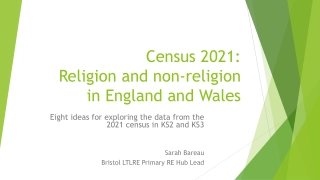
![Read⚡ebook✔[PDF] Blood of the Provinces: The Roman Auxila and the Making of Pro](/thumb/20539/read-ebook-pdf-blood-of-the-provinces-the-roman-auxila-and-the-making-of-pro.jpg)
![READ⚡[PDF]✔ European Mail Armour: Ringed Battle Shirts from the Iron Age, Roman](/thumb/20552/read-pdf-european-mail-armour-ringed-battle-shirts-from-the-iron-age-roman.jpg)

